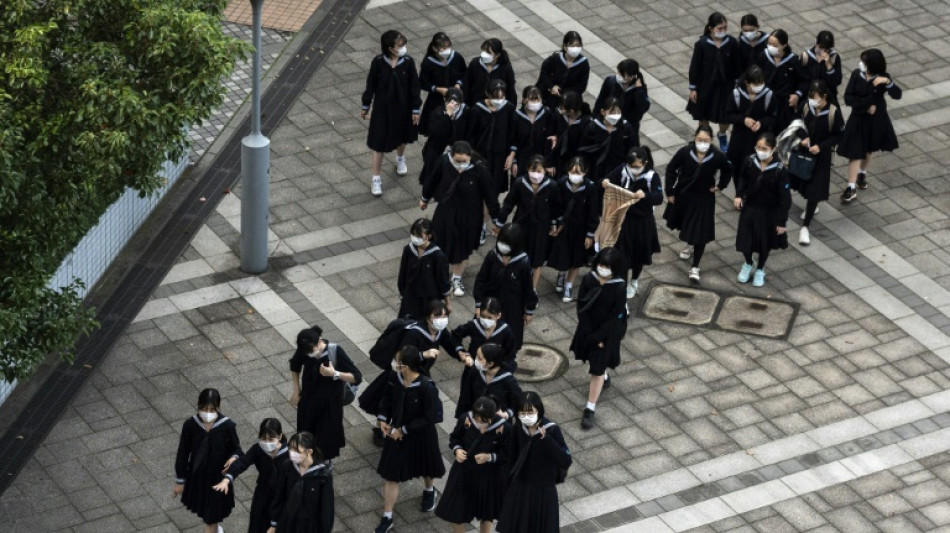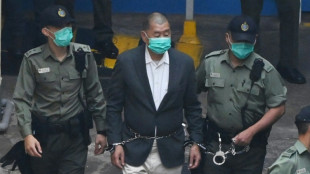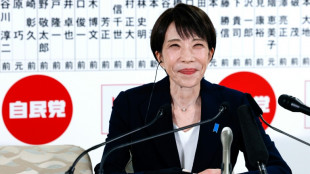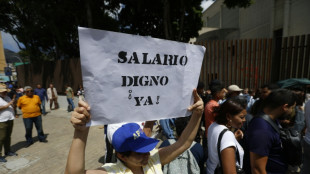
-
 Scotland spoil Italy's T20 World Cup debut with big win
Scotland spoil Italy's T20 World Cup debut with big win
-
Stocks track Wall St rally as Tokyo hits record on Takaichi win

-
 Israeli president says 'we will overcome evil' at Bondi Beach
Israeli president says 'we will overcome evil' at Bondi Beach
-
Munsey leads Scotland to 207-4 against Italy at T20 World Cup

-
 Venezuela's Machado says ally 'kidnapped' after his release
Venezuela's Machado says ally 'kidnapped' after his release
-
Japan restarts world's biggest nuclear plant again

-
 Bangladesh poll rivals rally on final day of campaign
Bangladesh poll rivals rally on final day of campaign
-
Third impeachment case filed against Philippine VP Duterte

-
 Wallaby winger Nawaqanitawase heads to Japan
Wallaby winger Nawaqanitawase heads to Japan
-
Thailand's Anutin rides wave of nationalism to election victory

-
 Venezuela's Machado says ally kidnapped by armed men after his release
Venezuela's Machado says ally kidnapped by armed men after his release
-
Maye longs for do-over as record Super Bowl bid ends in misery

-
 Seahawks' Walker rushes to Super Bowl MVP honors
Seahawks' Walker rushes to Super Bowl MVP honors
-
Darnold basks in 'special journey' to Super Bowl glory

-
 Japan's Takaichi may struggle to soothe voters and markets
Japan's Takaichi may struggle to soothe voters and markets
-
Bad Bunny celebrates Puerto Rico at Super Bowl, angering Trump

-
 Seahawks soar to Super Bowl win over Patriots
Seahawks soar to Super Bowl win over Patriots
-
'Want to go home': Indonesian crew abandoned off Africa demand wages

-
 Asian stocks track Wall St rally as Tokyo hits record on Takaichi win
Asian stocks track Wall St rally as Tokyo hits record on Takaichi win
-
Hong Kong sentences pro-democracy mogul Jimmy Lai to 20 years in jail

-
 Bad Bunny celebrates Puerto Rico in joyous Super Bowl halftime show
Bad Bunny celebrates Puerto Rico in joyous Super Bowl halftime show
-
Three prominent opposition figures released in Venezuela

-
 Japan PM Takaichi basks in historic election triumph
Japan PM Takaichi basks in historic election triumph
-
Israeli president says 'we shall overcome this evil' at Bondi Beach

-
 'Flood' of disinformation ahead of Bangladesh election
'Flood' of disinformation ahead of Bangladesh election
-
Arguments to begin in key US social media addiction trial

-
 Gotterup tops Matsuyama in playoff to win Phoenix Open
Gotterup tops Matsuyama in playoff to win Phoenix Open
-
New Zealand's Christchurch mosque killer appeals conviction

-
 Leonard's 41 leads Clippers over T-Wolves, Knicks cruise
Leonard's 41 leads Clippers over T-Wolves, Knicks cruise
-
Patriots-Seahawks Super Bowl approaches as politics swirl

-
 Trump says China's Xi to visit US 'toward the end of the year'
Trump says China's Xi to visit US 'toward the end of the year'
-
Real Madrid edge Valencia to stay on Barca's tail, Atletico slump

-
 Malinin keeps USA golden in Olympic figure skating team event
Malinin keeps USA golden in Olympic figure skating team event
-
Lebanon building collapse toll rises to 9: civil defence

-
 Real Madrid keep pressure on Barca with tight win at Valencia
Real Madrid keep pressure on Barca with tight win at Valencia
-
Dimarco helps Inter to eight-point lead in Serie A, Juve stumble

-
 PSG trounce Marseille to move back top of Ligue 1
PSG trounce Marseille to move back top of Ligue 1
-
Two prominent opposition figures released in Venezuela

-
 Hong Kong to sentence media mogul Jimmy Lai in national security trial
Hong Kong to sentence media mogul Jimmy Lai in national security trial
-
Lillard will try to match record with third NBA 3-Point title

-
 Vonn breaks leg as crashes out in brutal end to Olympic dream
Vonn breaks leg as crashes out in brutal end to Olympic dream
-
Malinin enters the fray as Japan lead USA in Olympics team skating

-
 Thailand's Anutin readies for coalition talks after election win
Thailand's Anutin readies for coalition talks after election win
-
Fans arrive for Patriots-Seahawks Super Bowl as politics swirl

-
 'Send Help' repeats as N.America box office champ
'Send Help' repeats as N.America box office champ
-
Japan close gap on USA in Winter Olympics team skating event

-
 Liverpool improvement not reflected in results, says Slot
Liverpool improvement not reflected in results, says Slot
-
Japan PM Takaichi basks in election triumph

-
 Machado's close ally released in Venezuela
Machado's close ally released in Venezuela
-
Dimarco helps Inter to eight-point lead in Serie A


Black hair, white shoelaces: Japan school rules under fire
Every school has its rules, but tough regulations at some Japanese institutions, mandating everything from black hair to white shoelaces, are facing increasing criticism and even legal action.
Toshiyuki Kusumoto, a father of two in western Japan's Oita, is seeking court intervention to protect his younger son from regulations he calls "unreasonable".
They include rules on hair length, a ban on styles including ponytails and braids, prohibition of low-cut socks and a stipulation that shoelaces be white.
"These kinds of school rules go against respect for individual freedom and human rights, which are guaranteed by the constitution," Kusumoto told AFP.
Later this month, he will enter court-mediated arbitration with the school and city, hoping authorities will revise the rules.
Change is already under way in Tokyo, which recently announced that strict rules on issues such as hair colour will be scrapped at public schools in the capital from April.
But elsewhere, the rules are fairly common and Kusumoto, who recalls chafing at similar restrictions as a child, hopes his legal action will bring broader change.
"It's not only about our children. There are many other children across Japan who are suffering because of unreasonable rules," he said.
Such regulations, which generally come into force when children enter middle school at around age 12, emerged after the 1970s, according to Takashi Otsu, an associate professor of education at Mukogawa Women's University.
- Rules 'destroyed a student's life' -
At the time, "violence against teachers became a social problem, with schools trying to control the situation through rules", he told AFP.
"Some kinds of rules are necessary for any organisation, including schools, but decisions on them should be made with transparency and ideally involving students, which would allow children to learn democratic decision-making," he said.
The array of regulations has been defended as helping ensure order and unity in the classroom, but there have been other challenges.
In 2017, an 18-year-old high-school girl who was repeatedly ordered to dye her naturally brown hair black filed a lawsuit in Osaka seeking compensation of 2.2 million yen ($19,130) for psychological suffering.
The case made national headlines and eventually led to the government last year instructing education boards to examine whether school rules reflect "realities around students".
But in a sign of the difficult debate over the subject, both Osaka's district and appeals courts ruled schools could require students to dye their hair black within their discretion for "various educational" purposes.
The student said she was regularly harassed over the issue even though she was colouring her hair to meet the requirements, according to her lawyer.
"This rule destroyed a student's life," he told AFP, speaking on condition of anonymity to protect his client's identity.
The student, now 22, has not given up though, and in November appealed to the supreme court.
- 'Recipe for unthinking children' -
There are other signs of pressure to change the rules, including a petition submitted to the education ministry in January by teen members of rights group Voice Up Japan.
They want the ministry to encourage schools to work with students on discussing rule changes.
"We started this campaign because some of our members have had unpleasant experiences with school rules," said 16-year-old Hatsune Sawada, a member of Voice Up Japan's high-school division.
The petition gives the example of a girl who was humiliated by a teacher for growing a fringe that, when flattened with a hand, covered the girl's eyebrows -- a violation of the rules.
In Oita, the rules also include school uniforms designated by gender, with trousers only for boys and skirts for girls.
The local education board says the rules "not only nurture a sense of unity among children but also ease the economic burden for families of buying clothes".
But Kusumoto disagrees.
"A sense of unity is not something that is imposed, it's something that should be generated spontaneously," he said.
Imposing these kinds of rules "is a recipe for producing children who stop thinking".
L.AbuTayeh--SF-PST




